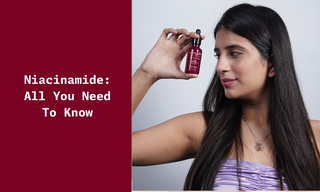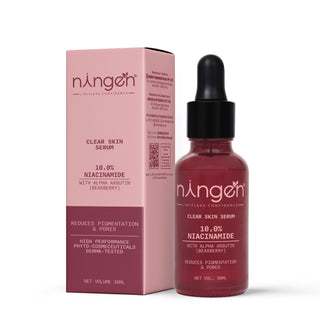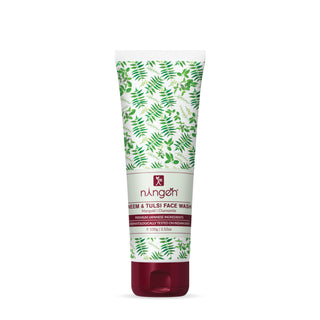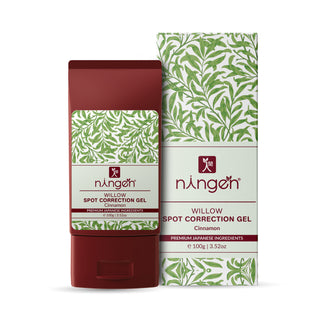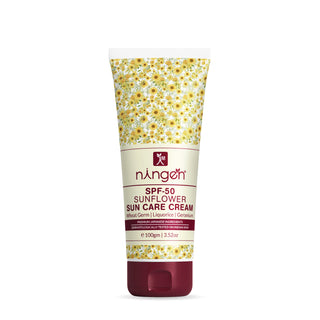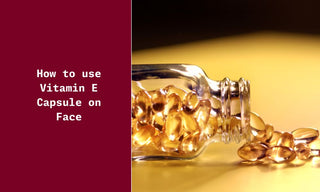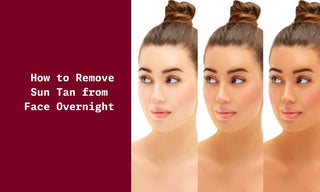Dive into the skincare sensation ‘Niacinamide’ with us!
Prepare to discover the wonders of this powerful skincare ingredient that's gaining popularity. From its amazing advantages to how it can improve your skin, come along as we simplify and explore. Whether you're new to skincare or a seasoned fan, this guide will help you grasp and use Niacinamide to achieve glowing and healthy skin.
Let's dive into this exciting journey together!
What is Niacinamide?
Niacinamide is a skincare superhero! It's a special form of vitamin B3 that does wonders for your skin. This fantastic ingredient helps to keep your skin happy and healthy. It can brighten your complexion, reduce redness, and even out your skin tone. Niacinamide is like a multitasking friend for your skin, working to make it look its best. Whether you're dealing with dark spots, fine lines, or an uneven skin texture, Niacinamide is here to lend a helping hand. It's a simple yet powerful addition to your skincare routine for a glowing and radiant look!
Niacinamide, also known as nicotinamide, is a form of vitamin B3 that has been gaining popularity in the skincare world. It is a water-soluble vitamin that is found in many of the foods we eat, such as meat, fish, eggs, and green vegetables.
How Does Niacinamide Work?
Niacinamide works like a skincare wizard, performing various magic tricks for your skin's benefit. When you apply Niacinamide, it gets absorbed and gets to work beneath the surface. Here's the breakdown:
-
Keeps Moisture In: Niacinamide helps your skin hold onto its precious moisture, preventing it from drying out. Say goodbye to dry, flaky skin!
-
Brightens Up: It's like turning on a light switch for your complexion. Niacinamide can help lighten dark spots and even out your skin tone, leaving you with a radiant glow.
-
Calms Down Redness: Got irritated or red skin? Niacinamide has soothing powers. It helps calm down redness and reduces inflammation, making your skin look and feel more peaceful.
-
Smooth Operator: Say hello to smoother skin! Niacinamide can help refine your skin's texture, making it soft and touchable.
- Fights Wrinkles: Niacinamide encourages the production of collagen, a protein that keeps your skin firm and elastic. This means it can help in reducing the appearance of fine lines and wrinkles.
Note: Know more about how to reduce wrinkles on face here.
In essence, Niacinamide is like a reliable friend that addresses various skincare concerns, leaving your skin happy, healthy, and looking its best.
What Are The Skincare Benefits of Using Niacinamide?
Using Niacinamide in your skincare routine comes with a variety of fantastic benefits for your skin. Here's a breakdown of its skincare perks:
-
Hydration Booster: Niacinamide helps your skin retain moisture, preventing dryness and keeping it well-hydrated.
-
Brightens Dark Spots: It's a pro at fading dark spots and hyperpigmentation, giving you a more even skin tone.
-
Reduces Redness: If you deal with red or irritated skin, Niacinamide has anti-inflammatory properties that can help soothe and calm your complexion.
-
Minimizes Pores: Niacinamide can tighten up your pores, making them look smaller and less noticeable.
-
Improves Skin Texture: Say goodbye to rough skin! Niacinamide can refine your skin's texture, leaving it smoother and softer.
-
Fights Aging: It stimulates the production of collagen, promoting firmer, more elastic skin and reducing the appearance of fine lines and wrinkles.
-
Regulates Oil Production: If you have oily skin, Niacinamide helps balance oil production, preventing excessive shine without drying out your skin.
-
Protects Against Environmental Damage: It acts as a shield against environmental stressors, helping to keep your skin resilient and healthy.
Niacinamide is a versatile ingredient that addresses multiple skin concerns, making it a valuable addition to your skincare routine for a radiant and healthy complexion.
Note: If you have dry skin, click here to learn how to treat dry skin.
How to Add Niacinamide to Your Skin-Care Routine?
Niacinamide offers a wide range of benefits, from improving the overall texture of your skin to reducing the appearance of fine lines and wrinkles. If you're looking to incorporate this powerhouse ingredient into your regimen, here's a guide on how to do so effectively.
First and foremost, it's important to determine which products in your existing routine can be replaced or augmented with niacinamide. This ingredient is known for its compatibility with a wide range of products, including cleansers, serums, and moisturizers. If you're already using a serum or moisturizer that works well for your skin, consider finding a niacinamide-infused version to swap it out with.
If you're starting from scratch, a serum is a great place to begin incorporating niacinamide into your routine. Look for a serum that contains a high concentration of niacinamide, typically around 5% to 10%. This will ensure that you are reaping the full benefits of the ingredient without causing any irritation to your skin.
When it comes to using niacinamide in your routine, it's important to note that it is compatible with a wide range of skin types, including sensitive and acne-prone skin. However, if you have particularly sensitive skin, it's always a good idea to patch-test new products before incorporating them into your routine.
In terms of application, niacinamide should be used after cleansing and before moisturizing. This allows the ingredient to penetrate the skin effectively and deliver its full benefits. Simply apply a few drops of the serum to your fingertips and gently massage it into your skin, paying special attention to any areas of concern.
In addition to its compatibility with other products, niacinamide also plays well with other active ingredients, making it easy to incorporate into your existing routine. It pairs well with ingredients such as hyaluronic acid, vitamin C, and retinol, further enhancing the benefits of these products when used together.
Adding niacinamide to your daily skincare is a simple and effective way to improve the overall health and appearance of your skin. By choosing the right products and incorporating them into your existing routine, you can harness the full power of this versatile ingredient and enjoy the radiant, glowing complexion you've always wanted.
Sources of Niacinamide and What to Look For
From improving the appearance of pores to reducing inflammation and addressing uneven skin tone, this multitasking vitamin has become a popular choice for skincare enthusiasts. But where can you find this potent ingredient, and what should you look for when choosing niacinamide skincare products?
There are several sources of niacinamide in skincare products. One of the most common sources is in the form of a serum or moisturizer. Many skincare brands have started incorporating niacinamide into their formulations, making it easier for consumers to access this beneficial ingredient. Additionally, niacinamide can also be found in some sunscreen products, as it has been shown to improve the skin's barrier function and protect against environmental stressors.
When looking for niacinamide products, it's important to pay attention to the concentration of the ingredient. Research has shown that niacinamide is effective at concentrations of around 2-5%. Higher concentrations may not necessarily offer better results and could potentially irritate some individuals. It's also important to consider the overall formulation of the product and how it complements your existing skincare routine.
In addition to serums, moisturizers, and sunscreens, niacinamide can also be found in some oral supplements. While it's always best to consult with a healthcare professional before taking any new supplements, some people have reported improvements in their skin when incorporating niacinamide into their diet.
Overall, niacinamide is a versatile and effective skincare ingredient that can be found in a variety of products. Whether you're looking to improve the texture of your skin or address specific concerns like hyperpigmentation or acne, niacinamide may be a worthwhile addition to your skincare routine. Just be sure to do your research and choose products that prioritize the effectiveness and safety of this powerful ingredient.
Niacinamide is suitable for all skin types, including sensitive and acne-prone skin. Its gentle nature makes it a great option for those who may be prone to irritation or redness. Remember, results may vary, so observe your skin's response and consult a dermatologist if needed.
How and When Do You Use Niacinamide?
Using Niacinamide is easy! Here's a simple guide:
-
Select a Product:
- Choose a serum, cream, or lotion containing around 2-5% Niacinamide.
-
Clean Your Skin:
- Start with a clean face, using your regular cleanser to remove any impurities.
-
Apply a Small Amount:
- Take a small amount of the Niacinamide product; a little goes a long way.
-
Layering Order:
- Apply before heavier creams or oils, and after lighter serums.
-
Frequency:
- Use it morning and evening, following product instructions.
-
Sunscreen (AM):
- If applied in the morning, follow with SPF 30+ sunscreen.
-
Consistency is Key:
- Use consistently for best results.
-
Patch Test:
- Always do a patch test before the full application.
Niacinamide is suitable for all skin types, including sensitive and acne-prone skin. Its gentle nature makes it a great option for those who may be prone to irritation or redness. Remember, results may vary, so observe your skin's response and consult a dermatologist if needed.
When Do You Use Niacinamide?
Niacinamide can be used both in the morning and at night. It's versatile and can be incorporated into your skincare routine based on personal preference and compatibility with other products. Whether you choose to use it in the morning or night, consistency is key for optimal results.
Who Should Use Niacinamide?
Niacinamide is suitable for a wide range of skin types and concerns, making it a versatile skincare ingredient. It's generally well-tolerated by various skin tones and conditions.
If you're looking to address issues like fine lines, hyperpigmentation, or enlarged pores, or if you simply want to enhance the overall health and appearance of your skin, niacinamide could be a beneficial addition to your skincare routine. However, as with any new skincare product, it's advisable to perform a patch test and consult with a dermatologist, especially if you have specific skin concerns or conditions.
How to Store Niacinamide
Niacinamide can be quite sensitive to certain environmental factors, such as light and air, which can degrade its potency over time. To ensure that it remains effective, it’s important to store them properly.
- Protect from light: Exposure to light can cause the niacinamide to break down and lose its effectiveness. To avoid this, store your niacinamide products in a cool, dark place, such as a cabinet or drawer. Avoid storing them in direct sunlight or near windows.
- Air exposure: Oxygen can also degrade the potency of niacinamide over time. To minimize air exposure, make sure the containers of the product are tightly sealed when not in use. This will help to prevent oxidation and maintain the product’s efficacy.
- Store it at the right temperature: Extreme temperatures, both hot and cold, can affect the stability of niacinamide. To ensure it remains effective, store them at room temperature. Avoid storing them in areas that are too hot or too cold, such as near radiators or in the refrigerator.
Do we actually need niacinamide in our skincare?
Niacinamide has become a popular skincare ingredient in recent years. But do we actually need it in our skincare routine?
The answer is, yes! Niacinamide offers a wide range of benefits for the skin and can be a valuable addition to anyone's skincare regimen.
- One of the key benefits of niacinamide is its ability to improve the overall texture and tone of the skin. It can help to reduce the appearance of fine lines and wrinkles, and can also help to minimize the appearance of pores. This makes niacinamide a great option for those looking to improve the overall appearance of their skin.
- In addition to its anti-aging properties, niacinamide also has anti-inflammatory and antioxidant properties, making it an effective ingredient for those with sensitive or acne-prone skin. It has been shown to help reduce redness and irritation, and can also help to regulate oil production, making it a great option for those with oily or combination skin.
- Furthermore, niacinamide has been found to enhance the skin's barrier function, helping to strengthen the skin and protect it from environmental stressors. This can help to keep the skin looking youthful and radiant, and can also help to prevent issues such as dehydration and sensitivity.
Overall, niacinamide is a versatile and effective skincare ingredient that can benefit a wide range of skin types.
The Bottom Line
‘Niacinamide: All You Need To Know’ reveals its remarkable benefits for skincare. From improving the skin barrier to addressing hyperpigmentation, this versatile ingredient is a well-tolerated hero. Armed with this knowledge, consider incorporating niacinamide into your routine for transformative effects, whether aiming for a clearer complexion or enhanced hydration. Skincare is a personal journey, so keep experimenting and embracing niacinamide as your invaluable ally for healthier, radiant skin.
Cheers to your newfound skincare hero!
Explore our recommended product selection for Niacinamide in the section below.
Frequently Asked Questions
What is niacinamide, and what role does it play in skincare?
Niacinamide, also known as Vitamin B3, is a water-soluble vitamin that has gained popularity in skincare. It is known for its various benefits, including improving the skin barrier, reducing inflammation, and addressing hyperpigmentation.
How does niacinamide benefit the skin?
Niacinamide offers several skin benefits, such as minimizing pores, regulating oil production, enhancing hydration, and providing antioxidant properties. It is also known for its anti-aging effects and ability to soothe irritated skin.
Can niacinamide be used for all skin types?
Yes, niacinamide is generally suitable for all skin types, including sensitive and acne-prone skin. It is well-tolerated and rarely causes irritation, making it a versatile ingredient for a wide range of skincare routines.
Is it safe to use niacinamide with other active ingredients?
Niacinamide is known for its compatibility with various skincare ingredients, including retinol and vitamin C. However, it's always recommended to patch test and introduce new products gradually to minimize the risk of any potential interactions.
How long does it take to see results from using niacinamide?
The time it takes to see results can vary among individuals, but many people notice improvements in skin texture and tone within a few weeks of consistent use. Long-term benefits may continue to develop over time.
Can niacinamide help with acne and blemishes?
Yes, niacinamide has anti-inflammatory properties that can help reduce redness and inflammation associated with acne. It may also assist in regulating sebum production, contributing to clearer skin.
Does niacinamide cause skin sensitivity or irritation?
Niacinamide is generally well-tolerated and is considered non-irritating. However, individual skin sensitivities vary, so it's advisable to perform a patch test before incorporating it into your regular skincare routine.
Can niacinamide be used during pregnancy or while breastfeeding?
Niacinamide is generally considered safe for use during pregnancy and breastfeeding. However, it's always a good idea to consult with a healthcare professional before introducing new skincare products during these periods.
What is the ideal concentration of niacinamide in skincare products?
Effective concentrations of niacinamide typically range from 2% to 5% in skincare products. However, lower concentrations can still provide benefits, and higher concentrations may be suitable for specific skin concerns.
Can niacinamide be used in the morning and evening?
Yes, niacinamide is versatile and can be used both in the morning and evening skincare routines. It plays well with other products and can be easily incorporated into various regimens for optimal results.


